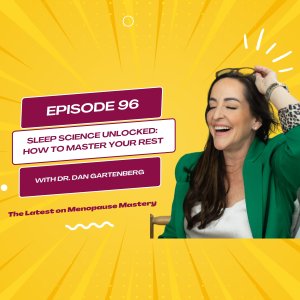Sleep is one of the most crucial pillars of health, especially as we age and go through hormonal changes like menopause. In this episode of the Menopause Mastery podcast, host Dr. Betty speaks with renowned sleep expert Dr. Dan about the science of sleep and practical tips to improve sleep quality during menopause.
4 Key Takeaways
Sleep Apnea: More Than Just Snoring
While severe snoring is a well-known symptom, sleep apnea exists on a spectrum. Mild cases, defined as reduced breathing over five times per hour, can still significantly impact sleep quality and overall health. Untreated sleep apnea can reduce life expectancy by about five years. Women, in particular, are often underdiagnosed. Some lesser-known symptoms include teeth grinding, acid reflux, and daytime fatigue. At-home diagnostic tests are now available to assess your risk affordably.
The Insomnia-Apnea Link
About 50% of sleep apnea patients also suffer from insomnia, a condition known as “chomisa.” Both conditions trigger a hyperarousal response, increasing stress hormones like cortisol and adrenaline. This can lead to more nightmares, mid-night awakenings, and non-restorative sleep. Menopause can intensify this due to decreasing progesterone levels.
While overusing devices late at night can disrupt sleep, technology used wisely can be a powerful ally. Apps like Dr. Dan’s Sleep Space use sound and light to enhance relaxation. Temperature regulation is key—cooling the core body and warming the limbs signals to the brain that it’s time for sleep. Products like cooling blankets and “smart” mattress pads can help maintain the ideal temperature throughout the night.
Balance Hormones, Balance Sleep
Fluctuating hormones during menopause, especially the decline of progesterone, which enhances the calming effects of GABA, can wreak havoc on sleep. Bio-identical hormone replacement, in consultation with your doctor, may help restore the balance. Herbal supplements that support GABA may provide a drug-free alternative to prescription sleep aids, which can have concerning side effects.
If you’re struggling with the effects of hormonal imbalance, book an appointment today.
The Bottom Line
Menopause is a time of great transition, and sleep is often one of the first things to suffer. By understanding the underlying factors, from breathing to hormones to temperature, you can take charge of your sleep health.
A combination of diagnostic testing, environmental changes, supplementation, and expert guidance can help you navigate this challenging time and emerge with the restorative, rejuvenating sleep you need to thrive.
Take the first step to improve your shut-eye by scheduling a consultation with Dallas Nutritionist Dr. Betty Murray!
CONTACT US

